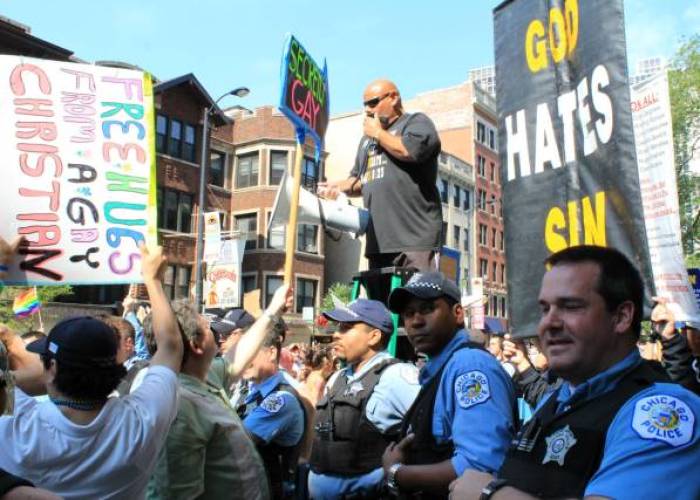Preachers 'Stoned' by Muslims Win Free Speech Case Against Police

A federal appeals court has ruled that police officers in the Muslim hotbed of Dearborn, Michigan violated the free speech rights of a group of Christian street preachers when authorities forced the evangelists to leave an Arab-American festival in 2012 after an angry crowd of Muslims began throwing objects at the them as they preached.
The Sixth U.S. Circuit Court of Appeals decided Wednesday, by a narrow 8-7 margin, that Wayne County, Michigan and two deputy police chiefs violated the constitutional rights of 12 evangelizing street preachers called the Bible Believers. The police officers kicked the evangelising group out of the 2012 Arab festival in Dearborn after a mob of Muslims grew enraged with the preachers, who held signs condemning Islam and also carried a severed pig's head.
One of the street preachers, Ruben Israel, a street preacher from Los Angeles who has evangelized for over 30 years, told The Christian Post last October that the preachers held up signs that stated that Islam is a "false religion."

When the evangelists went to preach, the crowd got so riled up that the police wouldn't allow the preachers to use their megaphones. As they preached, the crowd got angrier and bunch of Muslim kids and teens began throwing stones, water bottles and other objects at the preachers in what Israel claimed was a "stoning" process that lasted over an hour and a half.
Although the preachers called on the police officers to protect their freedom of speech from the animosity, the police officers failed to adequately stop the violent outrage. Israel was even hit in the head with a rock and suffered a big cut on his forehead.
Finally when the police officers came back to assess the situation, the preachers were told they had to leave the event or they would be arrested and charged with disorderly conduct.
In a reversal of an earlier decision from a 2014 three-judge federal appeals panel, the 15-judge panel ruled that Wayne Country and the two deputies are civilly liable to the preachers.
The court further ruled that even though the evangelists went to the festival with the intention of offending the Muslim community with "loathsome" messages condemning Islam, the preachers' freedom of speech is just as protected under the First Amendment of the Constitution as anyone else's speech. The court asserted that police department did not uphold its duties to protect the preachers' free speech rights.
"Although it might be inferred that the Bible Believers' speech was intended to anger their target audience, the record is devoid of any indication that they intended imminent lawlessness to ensue," the majority court found in an opinion written by Judge Eric L. Clay. "Quite to the contrary, the Bible Believers contacted Wayne County prior to their visit, requesting that the WCSO keep the public at bay so that the Bible Believers could 'engage in their peaceful expression.'"
The court found that although there was at least one Muslim youth who tried to get the angered Muslim crowd to ignore the preachers and at least one parent who scolded their child for participating in the "stoning," the mob's violent behavior largely went unchecked by police and adults.
"This case calls on us to confirm the boundaries of free speech protections in relation to angry, hostile, or violent crowds that seek to silence a speaker with whom the crowd disagrees," Clay wrote. "In this opinion we reaffirm the comprehensive boundaries of the First Amendment's free speech protection, which envelopes all manner of speech, even when that speech is loathsome in its intolerance, designed to cause offense, and, as a result of such offense, arouses violent retaliation."
The damages and legal fees that will be awarded to the Bible Believers will be sent to a federal district court to decide at a later date.
Robert Muise, an attorney for the American Freedom Law Center who represented the Bible Believers, told Reuters that the court's decision is a victory for the state of free speech in the United States.
"We're very pleased, and all freedom-loving Americans who enjoy the protections of the First Amendment should be pleased," Muise said. "Violence cannot be used to suppress speech that the listener dislikes, and the job of the police is to protect the speaker."




























